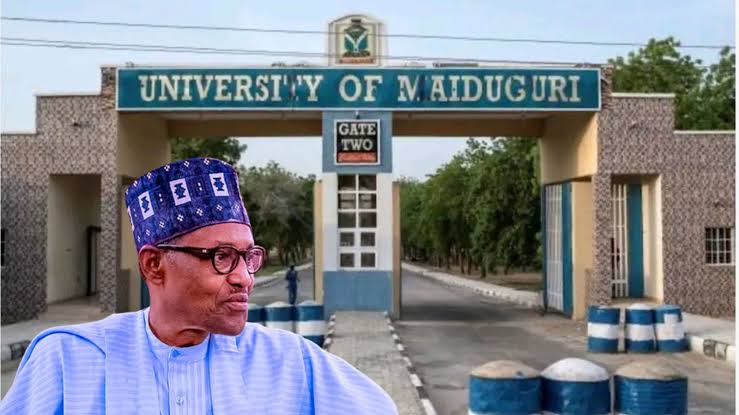Africa
Renaming UNIMAID: A Misstep Against Symbolic Justice and Regional Identity -By Turaki Abdulhamid Yahya
Honouring national leaders must be done equitably, contextually, and consultatively. President Tinubu’s administration should reconsider this decision, not to dishonour Buhari but to ensure that the Kanuri people, and indeed Borno State, are not erased from their own narrative.

In matters of national honour and symbolic recognition, context, history, and regional identity must never be ignored. The decision to rename the University of Maiduguri (UNIMAID) after former President Muhammadu Buhari has stirred considerable debate and rightly so. It is not a question of Buhari’s national significance, but of symbolic justice, cultural propriety, and respect for Borno State’s own towering legacy.
Honouring former presidents is a global tradition. But globally, such honours follow well-established standards: monuments or institutions are typically named after individuals who are either indigenes of the region or played a foundational role in the establishment of the institution. In this light, renaming UNIMAID fails both tests. President Buhari neither hails from Borno nor contributed directly to the founding of the university.
This inconsistency becomes clearer when viewed alongside other institutions:
1. Ahmadu Bello University (ABU) in Zaria honours the Northern icon who championed education and political leadership in the region.
2. Obafemi Awolowo University (OAU) in Ile-Ife immortalises a Western Nigerian nationalist.
3. Nnamdi Azikiwe University in Awka honours Nigeria’s first President, a Southeastern son of the soil.
By contrast, UNIMAID, a premier intellectual institution in the Northeast, carries the legacy of a region that predates modern Nigeria in civilization and scholarship. The Kanem-Bornu Empire, a historic beacon of Islamic scholarship and trans-Saharan diplomacy, forms the cultural backbone of the Borno people. The university stands as one of the few symbols of this enduring legacy. Renaming it, especially without broad consultation, erodes the pride and heritage of a people who have long contributed to the Nigerian state.
Moreover, Borno has already offered more than its share of national tribute to Buhari. The renaming of:
1. Maiduguri International Airport.
2. UNIMAID’s Senate Building.
3. UMTH Trauma Centre, and A female hostel, all in his or his wife’s name (Aisha Buhari), m is more than symbolic gratitude. It borders on overreach.
This over-concentration of honours to a non-indigene suggests an unbalanced national narrative, one that erases local heroes in favour of political expediency. Where are the honours for Aliyu Mai Borno, Baba Gana Kingibe, Waziri Ibrahim, Shettima Ali Monguno, all of whom represent Borno’s intellectual, administrative, and political contribution to Nigeria?
More so, there are better, more fitting alternatives for immortalising Buhari. The Federal University of Transportation in Daura, his hometown, remains untouched. This university was initiated and built under his administration. What better legacy project than that?
Ultimately, public institutions should not be renamed in haste or without broad stakeholder engagement. Doing so diminishes democratic credibility and fosters discontent. Institutions like UNIMAID are not just academic centres, they are cultural landmarks, carrying the hopes, histories, and identities of entire regions.
Honouring national leaders must be done equitably, contextually, and consultatively. President Tinubu’s administration should reconsider this decision, not to dishonour Buhari but to ensure that the Kanuri people, and indeed Borno State, are not erased from their own narrative.
Turaki Abdulhamid Yahya
Writes from the Department Mass Of Mass Communication,
Federal University Kashere, Gombe State.























